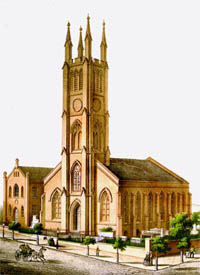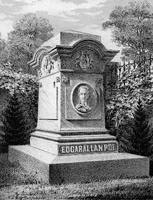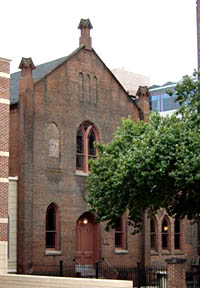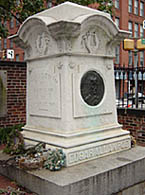|
Poe Burial Site
Westminster Church Cemetery 509 W. Fayette St. |
|
![]()
 Westminster Presbyterian Church - Then Courtesy: Maryland Historical Society |
 Poe's Memorial at its dedication in 1875 Courtesy: The Edgar Allan Poe Society of Baltimore |
Edgar Allan Poe died on October 7, 1849. Even in death, he has continued to confuse and inspire the people of Baltimore. Nothing better demonstrates this than the site of Poe's Grave.
In October 1849, Poe was buried at the family plot in the Westminster Burying Grounds. Because it was a family lot and the Poe family wasn't rich, there was no headstone. In fact, the grave wasn't marked at all until a few years after his death. A sympathetic Church sexton placed a small sandstone block with the number 80 by Poe's grave. Relatives learned of the sad condition of the grave in 1860. They commissioned a stone carver to create a small headstone. Unfortunately, it was destroyed in a train accident, and the family was too poor to have a new one made.
Then, near the end of the Civil War, an organization of citizens decided the famous poet deserved a memorial. School children around town collected pennies for Poe's grave. A Philadelphia man donated a large sum of money. Others in the city and beyond gave what they could. With the money that was collected, the citizens purchased a white marble memorial to be placed in the graveyard. The city decided that such a memorial shouldn't be in the back of the graveyard, where the Poe family plots were. So they dug up Poe's remains and moved them to the front corner of the grounds, closest to Fayette Street. The monument was dedicated in 1875. Among others, John H. B. Latrobe and the famous poet Walt Whitman attended the ceremony.
![]()
 Westminster Presbyterian Church - Now |
 Poe's Memorial - Now |
Today, you can still see the white marble statue while driving down Fayette Street. The large medallion in the middle of the statue was stolen in the 1970s. It has since been restored, along with the rest of the statue. Click here to visit the Edgar Allan Poe Society of Baltimore Webpage and learn more about the final resting place of Edgar Allan Poe.
